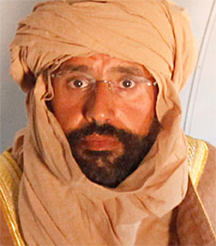ZINTAN, Libya (Reuters) – In a secret location, somewhere among the sandstone and concrete buildings of the straggling mountain town of Zintan, Libya’s most prominent prisoner awaits his fate.
Three months after he was captured far away in the Sahara desert dressed as a Bedouin tribesman, Saif al-Islam Gaddafi, son and one-time heir apparent of Libya’s fallen leader, is being kept here, ostensibly to keep him safe from harm until the new Libyan government can organize a trial for him.
But the ad hoc nature of his detention highlights just how little control that government yet has over the country and over rival local militias, like that from Zintan which captured him.

“Zintan people must keep him for now because Tripoli is not ready to keep him safe. Outside Zintan, he could be kidnapped or killed,” said one Zintan resident, chemistry teacher Bilgasim Abdallah, repeating the credo of the 35,000 townsfolk that he risks sharing his father’s bloody fate if taken to the capital.
“Here in Zintan, we can protect him but he needs to be handed over to face justice,” Abdallah said as he checked out the wares at a local bakery in the town this week. “We treat him well. We feed him. It’s our culture and the Islamic way.”
The ruling National Transitional Council (NTC) has accepted this state of affairs. Indeed, it has had little choice. The NTC head told Reuters two weeks ago that the 39-year-old, London-educated Saif al-Islam would be moved to a Tripoli prison within two months and then face trial.
But though an investigation by the prosecutor-general’s office is under way, many are skeptical that the interim leadership, with its hands full trying to impose itself on a host of fractious local groups as it tries to organize a first free election in June, truly has the means to hold and try him.




